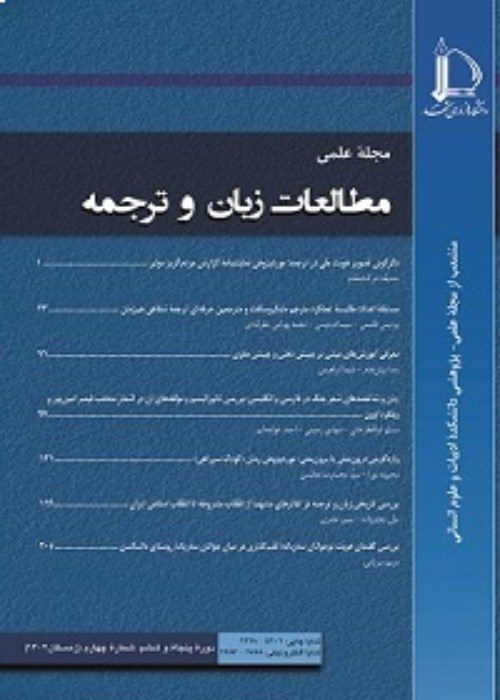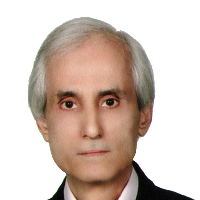Exploring Iranian EFL Teacher's Objectives of Foreign Language Teaching and Culture Teaching Time from Intercultural Communicative Competence Perspective
Author(s):
Abstract:
Introduction
The field of English as a foreign language (EFL) education has more recently witnessed changes of perspectives in favor of developing intercultural communicative competence over communicative competence. In light of this new outlook, the present study was an attempt to explore the way EFL teachers define the objectives of language education, to what extent their conceptions allow for the incorporation of teaching foreign-language culture, and whether they define the objectives in terms of intercultural competence or the more traditional approach to teaching culture. More specifically, the study focused on teachers teaching practices via an analysis of the balance of time they attribute to culture in contrast to language in their lessons.Methodology
To this end, 120 Iranian EFL teachers who were all English teachers with 1 to 6 years of teaching experience in private English institutes of Mashhad, along with 39 M.A. and 81 B.A., with an average age range of 20 to 28, were asked to complete a Foreign Language Teacher and Intercultural Communicative Competence Scale. The scale has different sections: teachers general teaching goals, teachers perceptions of the objectives of foreign language education, teachers perceptions of foreign language teaching in a foreign language teaching context, teachers perceptions of the time they devote to culture teaching and teachers willingness to devote more time to culture teaching. The scale mainly focuses on English language teachers attitudes, beliefs, and performance in the classroom. It is comprised of Likert items and some open-ended items for each section of the scale. Besides, four questions were asked to cover the participants demographic features such as their gender, age, qualifications, and their teaching experience. The participants were teaching at intermediate, upper intermediate, and advanced level.Results
The findings indicate that teachers define culture teaching more in the traditional sense of passing on the information regarding the foreign culture and far less in terms of promoting the acquisition of intercultural skills, knowledge, and attitudes desirably needed for the intercultural competent learner. Culture teaching is mainly overshadowed by the objective of improving learner's linguistic competence. They prefer language learning objectives and intend to promote linguistic competence of their learners in their classes and culture learning, which is a pivotal objective in intercultural education, is not considered important for them. Most of the teachers failed to meet the main required skills for teaching intercultural communicative competence skills. In addition, despite their awareness of the cultural differences and their willingness to spend more time on this issue, they did not have an adequate level of understanding of how to promote their learner's intercultural skills and they devoted their teaching time more over language teaching than culture teaching mainly due to their lack of time and tight schedule and curriculum and the wash back effect of the main proficiency tests of English as well.Discussion
These findings are discussed in light of socio-cultural theory and the genetic approach to have a better understanding of teachers thinking, practice, and context regarding culture teaching. The genetic approach is an exploratory approach, rather than a descriptive one, which takes into account the genes and human development over four domains; namely, phylogenetic domain (development of humankind as a natural species), cultural-historic domain (development in terms of the broader external world within which human exists, i.e., the social, cultural, and historic basis for the development), the ontogenetic domain (development of the individual across the human life span) and the microgenetic domain (the concrete and the practical activity that individual engages in with the world around them). Thus, an observable activity of a teacher (micorgeny) is shaped by the background, experience, and history of the teacher (ontogeny) and the activity system with the broader expectations of language teacher and teaching (cultural-historic). Regarding the teaching objectives Iranian teachers employ in their classes, they microgenetically conform to the language teaching objectives. However, the ontogeny of the participants of the study, who were all academic and had academic education, was reflected first of all in the willingness they possess towards devoting more time to culture teaching and secondly, in the pupil-oriented teaching goals they perceive more important rather than the subject-oriented ones while the teachers stated that they have a tight curriculum with the assigned textbooks that should be covered every term. But it is considered that the cultural-historic domain of development, i.e., the demands of the society part of which refers to the needs of the parents, who mainly concern with the speaking skills of their children and the number of vocabulary items they acquire, as well as the needs of the students themselves, who are interested in improving their proficiency and accent in the English classes, have made the policy of the institutes much stronger to the extent to which it leads teachers to touch upon language teaching objectives and devote more time to language side of education. The next part of the finding was teachers definitions of culture teaching. It was revealed that in teachers perception knowledge is of more essential concern rather than skills and attitudes dimensions. That is to say, if teachers find the chance to touch upon the culture side of language education, it is limited to its knowledge dimension and restricted to passing on the knowledge from teachers to pupils; in fact, the skill component remains uncovered. To shed further lights upon the space exists between microgenetic and ontogenetic development of the participants (the educated academic teachers); cultural-historic domain once again should be considered. The inquiry reveals the fact that students define a good teacher as a person who is considered as a source of knowledge. As a matter of fact, the knowledge of the teacher is of more interest and preference rather than their skills of teaching. Thus, ecologically, the preference to teach the knowledge dimension of culture teaching can be justified from the knowledge-oriented context of Iran.Language:
Persian
Published:
Language and Translation Studies, Volume:48 Issue: 2, 2015
Pages:
77 to 92
magiran.com/p1513807
دانلود و مطالعه متن این مقاله با یکی از روشهای زیر امکان پذیر است:
اشتراک شخصی
با عضویت و پرداخت آنلاین حق اشتراک یکساله به مبلغ 1,390,000ريال میتوانید 70 عنوان مطلب دانلود کنید!
اشتراک سازمانی
به کتابخانه دانشگاه یا محل کار خود پیشنهاد کنید تا اشتراک سازمانی این پایگاه را برای دسترسی نامحدود همه کاربران به متن مطالب تهیه نمایند!
توجه!
- حق عضویت دریافتی صرف حمایت از نشریات عضو و نگهداری، تکمیل و توسعه مگیران میشود.
- پرداخت حق اشتراک و دانلود مقالات اجازه بازنشر آن در سایر رسانههای چاپی و دیجیتال را به کاربر نمیدهد.
In order to view content subscription is required
Personal subscription
Subscribe magiran.com for 70 € euros via PayPal and download 70 articles during a year.
Organization subscription
Please contact us to subscribe your university or library for unlimited access!



